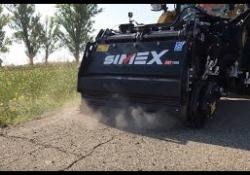While reclaimed asphalt can be added to the production process with reliable cold and hot recycling technologies, this does can result in higher emissions of total carbon (Ctot, volatile organic compounds (VOC)). When reclaimed asphalt is heated, part of the Ctot concentrations evaporate from the bitumen contained in the recycling material. These have a higher greenhouse potential than CO2 and are hazardous to health in higher concentrations.
The REVOC system is a solution for reducing emissions from asphalt production by making the existing mixing plants more efficient. The option of adding up to 60% recycling material can reduce emissions to comply with legal limits. At the same time, the higher recycling content also increases cost effectiveness of existing plants.
The REVOC system extracts the emissions where they are generated, primarily from the mixer. The generated vapours have increased Ctot concentrations and are moved to the REVOC system for thermal processing. This step uses the energy generated for drying and heating the virgin mineral and is therefore extremely energy-efficient. Most importantly, however, the technology can reduce Ctot emissions by up to 50%.




















